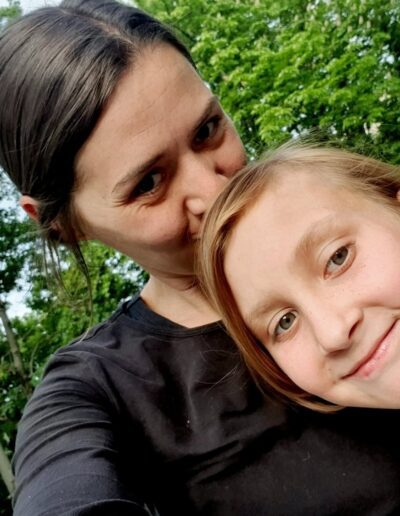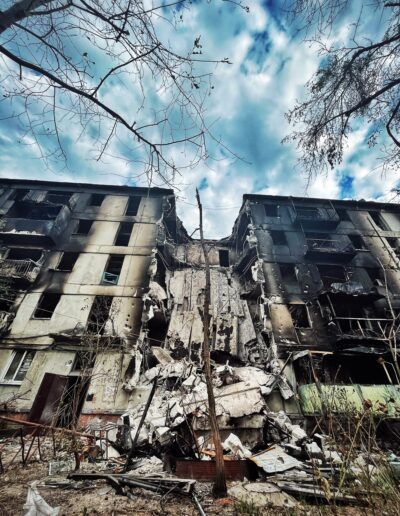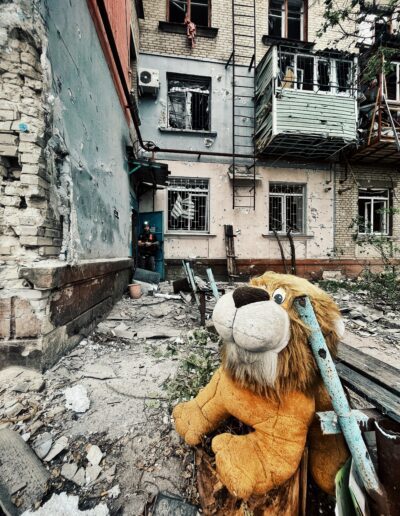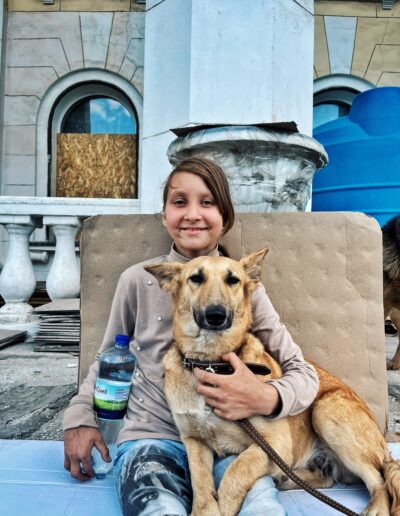Masha doesn’t even flinch.
As artillery fires outside in the eastern Ukrainian city of Lysychansk, the 12-year-old girl sits in front of a humanitarian aid center. She kneels by the side of the road, between a park and the massive, bright yellow building surrounded by white sandbags.
You can tell by the sound that artillery is being fired outside. A defensive shell pops. Brutal, echoing, impressive. But it is only a bang. Nothing more. A bomb that attacks whooshes and whistles before it pops. It hits, cracks deafeningly, and shakes everything around it.
The child pets a dog while it pops. She enjoys the sun. Another bang. The dog pulls its tail in. Masha talks to strangers outside the house. Laughs. There is another bang. Learned practice. Just keep going.
But the sounds get louder.
The defensive bullets are apparently getting closer. This makes the group standing by Masha nervous. Our team, some of whom have come from abroad. We have come to deliver relief supplies and evacuate people. The entire region is cut off from supply chains.
Here we are now, waiting for another team from our group – they have gone to what is probably the most dangerous of the towns that were under siege at the time: Syverodonetsk, which is just a few kilometers away from Lysychansk.
There’s Kevin, a former U.S. military medic. There’s Pasha, a Ukrainian who comes from the capital, Kiev, to help here in the east. Jodie is there trying to engage in conversation with people on the ground. Marharyta and Ivanovich are also part of the team. They’re looking around the area right now, because Marho is shooting a documentary.
And then there’s the child. Masha. A thin girl with long blond hair. Fragile body, resilient spirit. With her gaze she radiates warmth, but also indifference, perhaps weariness. As if the war is reflected in her green eyes – taking the color from everything, tinting everything gray.
The child with the gray sweater, washed-out jeans and sunglasses talks about her family. She lives here in the city with her two siblings and her parents, Masha tells us. Masha is the pet name for Maria. „We’re not leaving here,“ she says in Russian. Then she laughs as Kevin tries to calm the trembling dog with treats.
Twenty minutes earlier, one of the relief center staff had forbidden taking photos of the building. Neither inside nor outside. “There were four such centers in Sjewjerodonezk,“ the man with a ponytail yelled at Margo, who had just walked through the entrance hall with her camera. “Now there is only one, the Russians have destroyed all the others.“
At this time in May, Lysychansk is the only city in the Luhansk region still controlled by Ukraine, along with Syeverodonetsk. While our team waits in Lysychansk, Russian troops are in the process of attacking the only still-functioning bridge that leads in and out of there.
Since the full scale invasion started at the end of February, staying in this area has been life-threatening. Houses, streets, lanterns, cars: every street paints a picture of hell. Even during the day there are frequent bombardments. Even the way there can be deadly. It leads along a long straight road that is easily seen by Russian troops. While we are operating in the city, it is on this very road there that a French journalist is killed by a Russian shell.
Masha is alone in the city area that day.
This day that will probably determine her future life.
“We should probably move away from here a little bit,“ Kevin says as he leans against a relief ambulance. He taps his ear, glances right and left. “Can’t you hear the projectiles getting closer? That’s not a good sign.“ If defenses are getting closer, an attack is probably getting closer. “We should get out of here.“
But it doesn’t get that far.
It whistles.
There’s rustling.
There’s a crash, the earth shakes.
Everyone throws themselves to the ground. Everyone but the child remains standing. Masha looks around. Looks up, right and left. Her green-grey eyes search for a foothold.
She doesn’t know how to act – how could she? Who could have taught her?
Again comes the deadly whistle. The bang, the tremor.
Kevin grabs the girl by her skinny arms, pulls her down. There she lies and doesn’t know what to do. There is silence for a short while. Then the shouts start: “Go, go, go,“ shouts Pasha and pulls the girl back up. He points to the aid center, where we should all go.
Masha runs and runs – the 20 seconds feel like an eternity. Just before she reaches the entrance, there is another whistle, another noise, another crash. And again. And again.
Masha keeps running. Is lost in the chaos of those seeking help in the entrance area.
Screams, crowds, prayers, hugs fade into the thunderous roar of artillery aimed at us. Shattering window panes, impacts, pieces of stone crashing down. Masha is not to be seen. About 100 people squeeze into a side corridor inside the center. They press against walls hung with children’s drawings and certificates. Ivy grows from a ventilation shaft.
An old woman with dyed red hair stands against a pillar, tears her eyes open, looks back and forth – and puts her hands over her mouth. Others shout at each other.
Then another rocket hits. And for a fraction of a second, everything is completely silent. A policeman runs past, holding a radio to his ear. Another impact. People go down on their knees. The whimpering of a woman can be heard. Her teenage companion comforts her.
Thirty minutes the attack lasts. For 30 minutes, people scream, twitch, cry. The humanitarian aid center was hit four times. When it is silent for five minutes at a time, a gray sweater slips through the arms of two townspeople pressed together. Masha grins as she clings to Jodie’s arm. She looks up with her green eyes and presses her face into a hug.
Margo and Ivanovich arrive. What’s the plan now? Actually, people should be evacuated from Sjewjerodenozk. But here the need has just increased massively. And: staying longer on the ground could result in a new attack, could be fatal this time.
Margo, the thin woman with light brown frizzy hair, stands in front of the people and speaks to them. „I asked who wants to go with us,“ she explains, looking happy. „Many want to escape now.“
But what about the girl still clutching tightly to Jodie’s arm? Where are her parents?
Margo speaks quickly, but thoughtfully. She takes the girl’s hand. The girl responds, looking distressed. „Her mother doesn’t want to leave here, they don’t want to escape, but Masha is desperate to get out of here,“ Margo translates.
Kevin joins in and presses the issue. “We have to go,“ he says. But Margo pauses. She looks down at Masha. Then to Kevin. To the people in the hallway waiting to escape with their emergency bags. Again, she looks at Masha. “Margo, if you leave her here and she dies tonight in another attack, you’ll never forgive yourself,“ Kevin says.
Margo asks Masha something in Russian – and the child nods. “We’ll take her with us,“ the aide says. “When we’re safe, we’ll call her mother.“
Three hours later, Margo and Masha sit outside a hospital in the eastern Ukrainian city of Slovyansk. Margo is talking on the phone, upset; Masha is listening.
“We’re supposed to bring her back,“ Margo says. With no expression on her face.
We also have a long discussion in the team. And fiercely. Everyone understands the decision to bring the child to safety – and yet she must not be taken away from the parents. “We’re definitely not going to drive her back, though,“ says someone on the team. Nor do we have to.
Masha has the power of persuasion. The next day, we are able to take the mother out of the city with her two other children and other refugees. The father stays.




